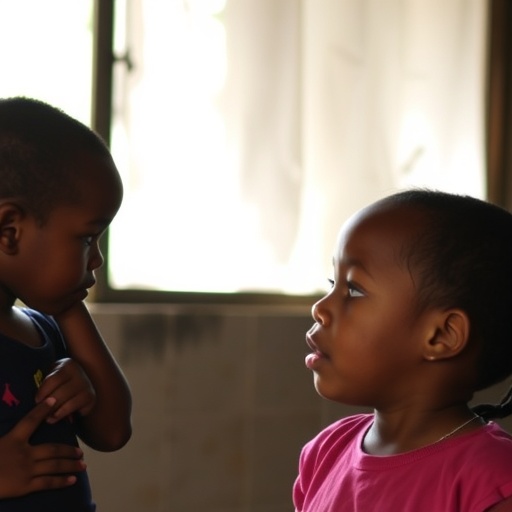In a groundbreaking study that addresses a pressing health issue in Nigeria, researchers have uncovered critical insights into the prevalence and associated risk factors of acute respiratory tract infections (ARTIs) among children under the age of five. Conducted in a tertiary hospital, the findings of this research reveal valuable data on how these infections affect one of the most vulnerable populations in the country. Understanding the dynamics of ARTIs is crucial, as they remain a leading cause of morbidity and mortality in young children worldwide, especially in developing nations like Nigeria.
The study was driven by the alarming statistics that highlight the severity of respiratory infections among children. Statistics show that respiratory tract infections account for a significant percentage of hospitalizations in this age group, with children being particularly susceptible due to their developing immune systems. This vulnerability underscores the need for comprehensive research that can identify not only the prevalence of such infections but also the contributing risk factors that can lead to their onset.
In Nigeria, where health care resources are often strained, episodes of ARTIs pose considerable challenges for families and the healthcare system alike. The prevalence of these infections can vary significantly by region and is influenced by multiple socio-economic and environmental factors. Through meticulous data collection and analysis, the researchers aimed to shed light on the specific elements contributing to the high rates of respiratory infections among under-five children in Nigeria.
One of the fundamental aspects of the study involved examining the socio-economic backgrounds of the affected children. Factors such as family income, parental education, and access to healthcare services were scrutinized. The findings suggest that children from lower socio-economic backgrounds are disproportionately affected by ARTIs. This correlation calls for targeted interventions that focus on improving living conditions, enhancing educational opportunities for parents, and ensuring better access to healthcare facilities.
Environmental conditions, particularly in urban slums, were also highlighted as critical risk factors for ARTIs. Poor air quality, overcrowding, and inadequate sanitation are rampant in such areas, creating an environment where respiratory infections can flourish. The study revealed a significant association between exposure to these adverse environmental factors and the incidence of respiratory infections in children. Mitigating these conditions is imperative for public health initiatives aimed at reducing the burden of ARTIs in vulnerable populations.
Moreover, the researchers did not shy away from investigating healthcare-seeking behaviors among parents and guardians. The study found that many caregivers hesitate to seek medical care early in the course of the illness, often due to financial constraints or a lack of understanding of the urgency required in such situations. This delay can lead to worse health outcomes, emphasizing the necessity for health education campaigns that inform parents about the signs and symptoms of respiratory infections and the importance of timely medical intervention.
Vaccine coverage was another critical parameter evaluated in this research. Vaccines such as those for influenza and pneumonia can significantly reduce the incidence of respiratory infections. However, the study found that in many areas, vaccination rates were alarmingly low due to misconceptions about vaccine efficacy and safety, as well as logistical barriers in accessing vaccination services. Increasing awareness of the importance of immunization is essential to protect this vulnerable population from respiratory diseases.
The psychological impacts of ARTIs on families are often overlooked. The frequent hospital visits and the stress associated with managing a sick child can have profound effects on family dynamics. This study delves into the emotional toll on parents, who may experience anxiety and frustration during episodes of illness. Addressing these psychological aspects is just as vital as focusing on the physical health of the children, as a holistic approach to healthcare can improve outcomes for both children and their families.
In conclusion, the research conducted at the tertiary hospital presents an alarming and enlightening perspective on acute respiratory tract infections among under-five children in Nigeria. With a multifaceted approach that considers socio-economic, environmental, educational, and psychological factors, the findings provide a comprehensive overview of the complexities surrounding ARTIs. The implications of this research are far-reaching, as they can inform policy decisions and intervention strategies aimed at reducing the incidence of these infections and improving the overall health of children across Nigeria.
Arising from this study, health authorities in Nigeria must prioritize strategies that address both the immediate health concerns and the broader socio-economic conditions that contribute to the prevalence of respiratory infections. The insights garnered from this research shine a light on the urgent need for integrated health policies that can address the root causes of these infections while providing adequate medical care for affected children.
Ultimately, the fight against acute respiratory tract infections in under-five children in Nigeria requires a sustained and collaborative effort. Researchers, policymakers, healthcare professionals, and community leaders must join forces to develop effective solutions that protect the health and well-being of the nation’s youngest citizens. Only through concerted efforts can we hope to see a decline in the prevalence of ARTIs and an improvement in child health outcomes across Nigeria.
Subject of Research: Acute Respiratory Tract Infections in Under-Five Children in Nigeria
Article Title: Prevalence and Associated Risk Factors of Acute Respiratory Tract Infections among Under-Five Children in a Tertiary Hospital in Nigeria
Article References:
Abubakar, F.I., Oche, O.M., Kaoje, A.U. et al. Prevalence and associated risk factors of acute respiratory tract infections among under-five children in a tertiary hospital in Nigeria. BMC Pediatr 25, 880 (2025). https://doi.org/10.1186/s12887-025-06193-4
Image Credits: AI Generated
DOI: 10.1186/s12887-025-06193-4
Keywords: Acute respiratory tract infections, under-five children, Nigeria, healthcare access, socio-economic factors, environmental health, vaccination coverage, family dynamics.
Tags: acute respiratory infections and child healthacute respiratory infections in Nigerian childrenhealthcare challenges in Nigeriaimmune system development in childrenmorbidity and mortality in young childrenpediatric health in developing countriesprevalence of respiratory infections in Nigeriapublic health research in Nigeriaregional variations in infection prevalencerespiratory tract infections and hospitalizationsrisk factors for childhood respiratory infectionsvulnerable populations and health risks





